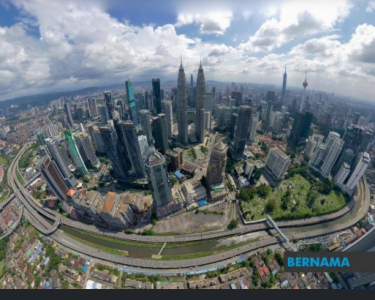KUALA LUMPUR, Malaysia, Feb 24 (NNN-BERNAMA) — Malaysia’s economy is going strong and the gross domestic product (GDP) is expected to expand a further 4.9 per cent in 2019, albeit, a decline in inflationary pressure.

Finance Minister Lim Guan Eng said the January 2019 Consumer Price Index (CPI) decline was not caused by recession or any kind of weak demand.
“Strong economic growth numbers, with the economy expanding by 4.7 per cent in 2018, immediately dispels any deflationary fears following the drop in January 2019 CPI by 0.7 per cent, the lowest in nearly 10 years.
“The CPI decline proves that the government’s policy of abolishing the Goods & Services Tax (GST) and replacing it with the Sales & Services Tax (SST) and stabilising fuel prices with a ceiling price mechanism works by expanding the economic pie to benefit both businesses and the people,” he said in a statement today.
While saying that the January 2019 price decline was different from the 2009 deflation, he added that it did not arise from any weakening of demand or economic growth, instead, the decline was largely caused by supply factors in the form of cheaper input cost, specifically cheaper fuel prices
Price of RON95 petrol, for instance, was approximately 13 per cent cheaper in January 2019 compared with a year ago and this has positively affected the prices of goods and services that are free from GST.
The fuel price stabilisation policy, in particular, passes the savings from cheaper fuel prices directly to consumers immediately while the ceiling price mechanism protected them from high and soaring petrol prices.
“The price decline should improve the purchasing power of Malaysian consumers and add to economic growth.
“The low inflationary environment has encouraged private consumption to grow at a fast pace of 9.0 per cent and 8.5 per cent, year-on-year, in the third and the fourth quarters of last year, respectively,” he added.
Lim also said another proof that the economy was healthy was the fact that the Nielsen survey showed Malaysia’s consumer confidence stood at 118 points in the fourth quarter of 2018, 24 points higher from a year ago.
The jump is the highest among all countries surveyed and it placed Malaysian consumers as the 7th most confident among 64 economies.
Additionally, approved manufacturing foreign direct investments for the first nine months of 2018 rose to RM48.8 billion or 249 per cent higher than the same period in 2017.
“These approved investments are expected to create an additional 41,000 quality manufacturing jobs in the next two to three years that can help improve local wages,” he added.






